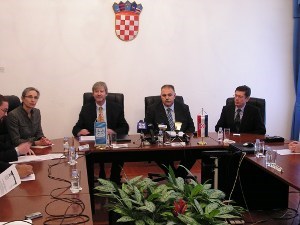- Published: 13.04.2010.
World Bank Supports the Government of Croatia in Improving the Efficiency of the Croatian Justice System
Vice Prime Minister and Minister of Finance, H.E. Ivan Šuker and the World Bank's Country Manager for Croatia, Andras Horvai, today signed a Loan Agreement in the amount of EUR26 million (USD$36.3 million equivalent) for the Justice Sector Support Project to the Republic of Croatia aimed at further improving the efficiency of Croatia's justice system - a necessary process in Croatia's path towards successful European Union accession.
The Justice Sector Support Project will improve efficiency through support for implementation of key reform legislation related to the modernization and upgrading of the capacity of three key elements of Croatia's justice system - the courts, the prosecution, and the Ministry of Justice.
Project activities will contribute to improving the efficiency of the court system through consolidation of the court network in Split, Karlovac, and Pula, while at the same time modernizing courts' operational information systems and strengthening case management practices. The State Attorney's Office will also be strengthened with the aim of speeding up prosecution processes through investments in infrastructure, modernization of operational information systems, and institutional strengthening. In addition, the project will strengthen the management functions of the Ministry of Justice.
"This loan will support the strengthening of the judiciary system and the implementation of reform measures aimed at aligning the judiciary sector to European Union standards. The objective of the project is to improve the efficiency of the judiciary in Croatia" said, Ivan Šuker, Vice Prime Minister and Minister of Finance of the Republic of Croatia
"The development of an independent, professional and effective judiciary system represents a key prerequisite not only for Croatia's European Union accession, but also for the development of a mature and sustainable democracy based on a series of other reforms. These include economic reforms and creating an atmosphere of trust in the Croatian economy, a necessary precondition for further development. In line with this, the reform of the Croatian judiciary system is one of the highest priorities of the Government of the Republic of Croatia," said Ivan Šimonović, Minister of Justice of the Republic of Croatia.
"However, each reform, very often requires significant funds. Therefore, the funds as well as the professional assistance we secured through this loan represent a significant contribution toward these efforts. The Ministry of Justice is ready and determined to use these funds in the best possible way to further strengthen the efficiency of the judiciary system.", concluded Ivan Šimonović, Minister of Justice of the Republic of Croatia.
"A well-functioning justice system is a prerequisite for a modern, thriving society in which citizens and businesses can fully rely on the efficiency, transparency, independence, and professionalism of critical justice sector components like the courts and the prosecution," said Andras Horvai, World Bank Country Manager for Croatia. "The Justice Sector Support Project is the fourth in a series of World Bank-financed operations in Croatia which are helping the Croatian authorities improve the overall efficiency of the justice system. We are very glad that this project will significantly contribute to making Croatia's justice system more efficient and will help the Croatian government to align the system with European Union member states, thereby facilitating Croatia's EU accession process."
As a result of this project, case backlogs in targeted courts and prosecution offices will be reduced. In addition, processing time in targeted courts will be reduced for key stages of the judicial process that are currently experiencing long delays, such as service of notice to parties, time between first and final hearings and testimony of expert witnesses. Finally, user ratings for efficiency for project-financed courts and prosecution offices will be improved.
The loan was approved by the World Bank's Board of Executive Directors on April 6, 2010 at a 6-month LIBOR for EUR plus the fixed spread (which would currently translate into an interest rate of about 2 percent), due for repayment after 18 years.
Since joining the World Bank in 1993, Croatia has benefited from financial and technical assistance, policy advice, and analytical services provided by the global development institution. To date, the World Bank has approved 46 loans to Croatia amounting to around US$3 billion, and approved 51 grants for Croatia with a total value of US$71 million.
For more information about the World Bank's work in Croatia, visit
www.worldbank.hr
